Countermeasures Series 1
Saturday, 29 November 2014 - Reviewed by
 Threshold, Artificial Intelligence. The Pelage Project, State of Emergency
Threshold, Artificial Intelligence. The Pelage Project, State of Emergency Written By: Paul Finch, Matt Fitton, Ian Potter and Justin Richards
Directed By: Ken Bentley
Producer: David Richardson, Script Editor: John Dorney
Executive Producers Jason Haigh-Ellery and Nicholas Briggs Big Finish Productions 2012
In an ideal world the Seventh Doctor’s era would have had the relative ratings that Ecclestone, Tennant, Smith and now Capaldi enjoy on Saturday nights; and the demand would have been for further adventures with these three very human characters in a sister show along the lines of 'Torchwood'. Luckily ‘Big Finish’ is the saviour of many a lost cause and these adventures – now in their third season – have been given a chance at long last.
The actual premise of this series concerns the three colleagues being officially united under the banner of ICMG – the ‘Intrusion Countermeasures Group’ - where their role is to try and find the cause of paranormal or alien phenomena occurring in Britain. Only months after their escapades with Davros, Ratcliffe, countless Daleks, and the eerie girl/battle-computer this functions as their first real test. The man with two hearts is not able to help out. They are therefore thrust into making some difficult decisions and must show their ability to adapt to the wider context that is 1960s Britain.
The three core characters of Gilmore, Allison and Rachel are reprised by the original actors: Simon Williams, Karen Gledhill and Pamela Salem. They definitely are having a fun time revisiting these roles and all manage to give a good account of themselves; with perhaps a little leeway being required with Simon and Pamela sounding a little bit older than their actual characters for obvious reasons. They are joined in the regular cast by Hugh Ross as Toby Kinsella, a somewhat unknown quantity in that while he helps the Countermeasures team to function by liaising with the British government, he has some of his own motivations that skirt the edges of immorality. Alastair Mackenzie also features on a recurring basis as Julian St Stephen - Allison's boyfriend of three years. This character is given a strong arc of his own which wrong foots expectations.
The opening episode is a solid enough beginning if somewhat unoriginal and static as a stand-alone piece. An apparent ghost is at work and an eminent German scientist has suddenly vanished. The villain (or misguided antagonist depending on your parameters) is somewhat broadly sketched as a crazed scientist/ Nazi stereotype. The actor’s performance is pretty arch on top of this, reminding me of a similar stereotype from Lucasarts' PC game 'The Fate of Atlantis'. The attempts to fill in a back story with Rachel’s admiration for his work are a good idea but do not quite get the right pay off when the dust settles at the end of the events. Episode Two already has signs of the show hitting its stride. A Czechoslovakian former flame of Gilmore has found a device of terrifying power but also great potential benefit. This artificial intelligence will end up influencing the behaviour of various characters dramatically. Eventually the dilemma hinges on how to contain such a sentient creation. There is quite a bit of important set up for later in the season – especially with Allison’s beau Julian. The villain of this particular piece is rather more effective here and he is described by Professor Jensen as making her ‘skin crawl’. Even his eventual fate is done in a surprising and shocking fashion and will make listeners reconsider one of the main cast in a wholly different light.
The following story has some memorable concepts of genetic augmentation and is quite satirical in many ways. Within the newly built town of Pelage, a dangerous encounter ensues with Ken Temple, a man with a very novel mindset as regards the future prospects for planet Earth and how mankind will have to adapt to survive. Political party funding is to blame for Temple's progress thus far and the Countermeasures team need to find a way to halt total chaos. This third episode has many good aspects but is slightly ruined by a perfunctory ending which seems overly predictable and also vetoes having a good supporting character return in a future story, By now the regulars are quite fluent in their roles and are still being developed organically as one would hope. Also the majestic Stephen Greif (of Blake's 7 fame) turns in a fine performance as Temple. This man has a tenuous grasp on reality but cannot be faulted for lacking pioneering ambition,
The series finale is a riveting tale - full of revelations, action and strong evocation of the time period. The story builds upon the plot device of 'Threshold'- with Rachel having apparently solved the issues that the matter transporter had previously. Events are set during Harold Wilson's elevation to Prime Minister. Pressure is put on the Countermeasures team as Chancellor Callaghan plans to reduce the budget of the Ministry of Defence. Before long creatures from another plane of existence make their presence felt, just as a group led by a senior military figure looks to stage a coup. How many of the closest friends and colleagues of Ian, Rachel and Allison will turn out to prove rogue? I never was left being distracted with this fourth story, which rewarded the work required to get committed to the previous plays. The villains may have some despicable methods but at the same time are believable and credible up to a certain point, and the character of Toby continues to shine brightly as a fine combination of writing and performance.
Overall 'Countermeasures' has good pacing and distinct atmosphere, and the stories are pretty easy to grasp. The show doesn’t force too many characters or require the listener to visualise too much difficult material. The character development and overall portrayal of individuals is very solid. There are lots of themes that resonate and tie in well to the time period the show is meant to be set in. Sometimes the plot doesn't feel too conspicuous either which is always welcome given how formulaic the Doctor Who fictional universe can inevitably be on occasion. Plenty of scope remains to explore how our three heroes really do feel about being back together on a long-term basis; hooks for the listener are not in short supply.
As for the original theme tune it is of the brand that stays in the head, but not really something I would want to play to myself outside of the show itself. Other music is serviceable enough and conjures up atmosphere without being intrusive. The show has started on a solid footing and the brilliance of Ben Aaronovitch’s creations means that it would take something drastic to deliver a noticeably weak story.
Behind the scenes material is also very good as we get a grasp behind the creative process from the individual writers as well as the producers and directors. Quatermass stories had a huge influence on the source Dalek story, and so its ability to inspire these new stories is an obvious place to start. Much strong discussion ensues over various 'chapters'. A generous run time of well over an hour is very welcome and rounds off the box-set package nicely.
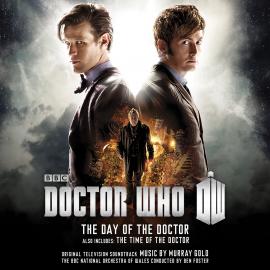
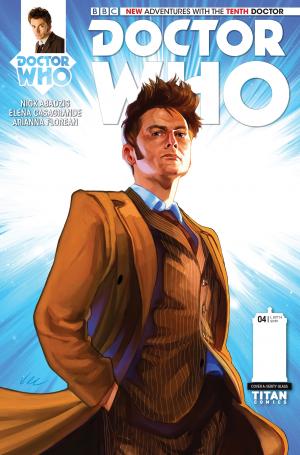
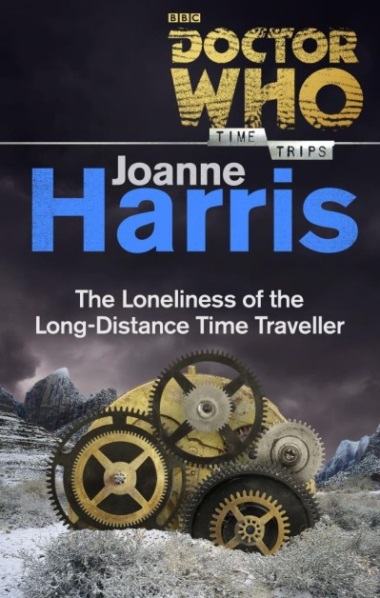 This seventh entry in the Time Trips series of e-books is the work of Joanne Harris, and sees the Third Doctor on the brink of oblivion as he struggles to hold back the deadly radiation he was exposed to on Metebelis Three. The Doctor is the only series regular character to feature, and that is because of his predicament in trying to land back 'home' - i.e. UNIT HQ. After the TARDIS is instead forced down into a Time Paradox ensnared village, with a 'Groundhog Day' style routine questions abound. But soon it is clear that the Doctor must somehow save the day once again - despite his very weak condition.
This seventh entry in the Time Trips series of e-books is the work of Joanne Harris, and sees the Third Doctor on the brink of oblivion as he struggles to hold back the deadly radiation he was exposed to on Metebelis Three. The Doctor is the only series regular character to feature, and that is because of his predicament in trying to land back 'home' - i.e. UNIT HQ. After the TARDIS is instead forced down into a Time Paradox ensnared village, with a 'Groundhog Day' style routine questions abound. But soon it is clear that the Doctor must somehow save the day once again - despite his very weak condition. 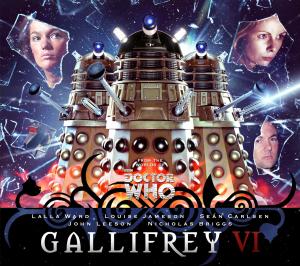

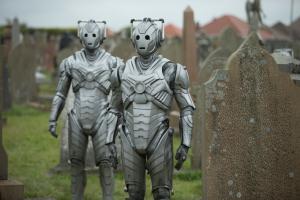 A further big highlight is Clara's brave pretence to her friend that she she has used Missy's techno-bracelet to have the 'normal' Danny restored to her. This scene of two people talking in an unremarkable cafe setting may seem low-key, but is acutely moving. The added dimension of the Doctor also covering his loss by lying that the Master for once told the truth is brilliant. I really doubt that Doctor Twelve will mellow out too much when he still has so much angst and loneliness to process.
A further big highlight is Clara's brave pretence to her friend that she she has used Missy's techno-bracelet to have the 'normal' Danny restored to her. This scene of two people talking in an unremarkable cafe setting may seem low-key, but is acutely moving. The added dimension of the Doctor also covering his loss by lying that the Master for once told the truth is brilliant. I really doubt that Doctor Twelve will mellow out too much when he still has so much angst and loneliness to process.




